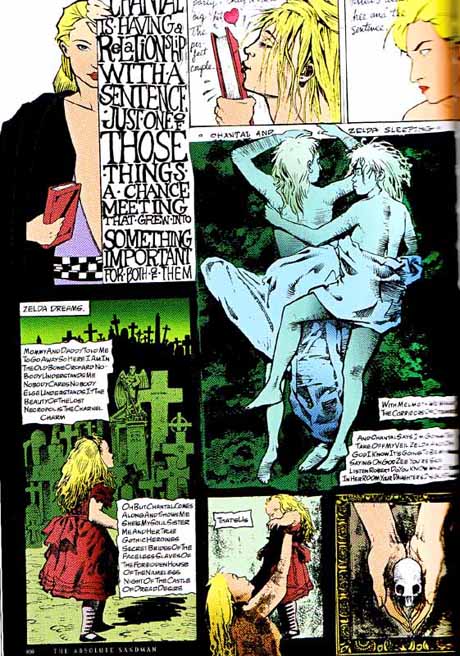Image from Neil Gaiman’sSandman 15
Gene Phillips of The Archetypal Archive has a post up today, “The Empiricist of Dreams,” that makes extensive reference to Frye.
A sample:
The battle between Freudian reductionism and Jungian amplification has been fought on other fronts, as when Northrop Frye describes the “distinction between two views of literature that has run all through the history of criticism. These two views are the aesthetic and the creative, the Aristotelian and the Longinian, the view of literature as product and the view of literature as process.”—Frye, Anatomy of Criticism, p. 66.
Frye probably borrowed the terms “product and process” from the writings of Alfred North Whitehead, while his opposition of Aristotle and Longinus may remind some readers of this blog of a similar opposition by R.A. Habib, which I reprinted in The Sphere of Longinus. I frankly don’t like Frye’s terms “aesthetic” and “creative,” which Frye himself doesn’t use often, either in the Anatomy or elsewhere. I much prefer the opposition he makes in another essay, quoted here, between a story’s “narrative values” and its “significant values.” In contradistinction to what Frye writes in this section of the Anatomy, I would say that while I agree that Aristotle is indeed more aligned to the view of literature as product, this goes hand-in-hand with a tendency to see literature as a means of transmitting “significant values.” Thus literature is just one step up from rhetoric, in that its purpose is to convey those values through a fictional façade, much as Freud would’ve believed that a dream’s purpose was to convey the psychological truths of sexual repression. In contrast, though Longinus wasn’t without his own concern for “significant values,” on the whole he seems more concerned with pure “narrative values” when he speaks of how poetry’s effects bring forth the internal ecstasy he calls “the sublime.” This in turn squares up with Jung’s tendency to value dream-fantasies for their own communicative power, not as representations of something else.


Hi, Michael. As I said when you informed me of the link I’m looking forward to taking more time reading your site.
I have to admit that in the section you quote I’m not *sure* that Frye never used the terms “aesthetic” and “creative” very often; I just couldn’t remember coming across the terms elsewhere. They feel a bit dashed-off, coming as they do at the end of an Anatomy-chapter.